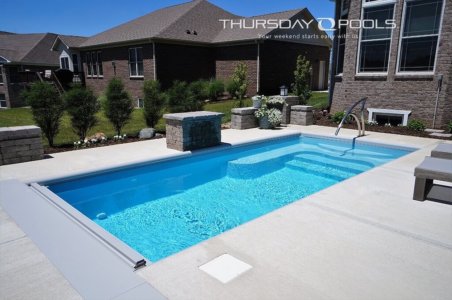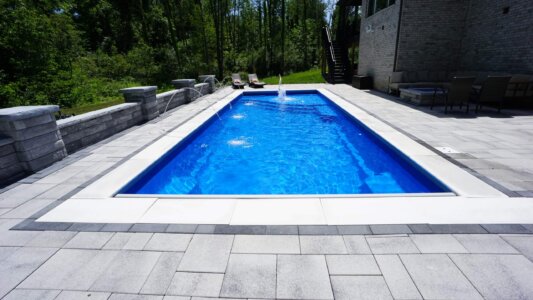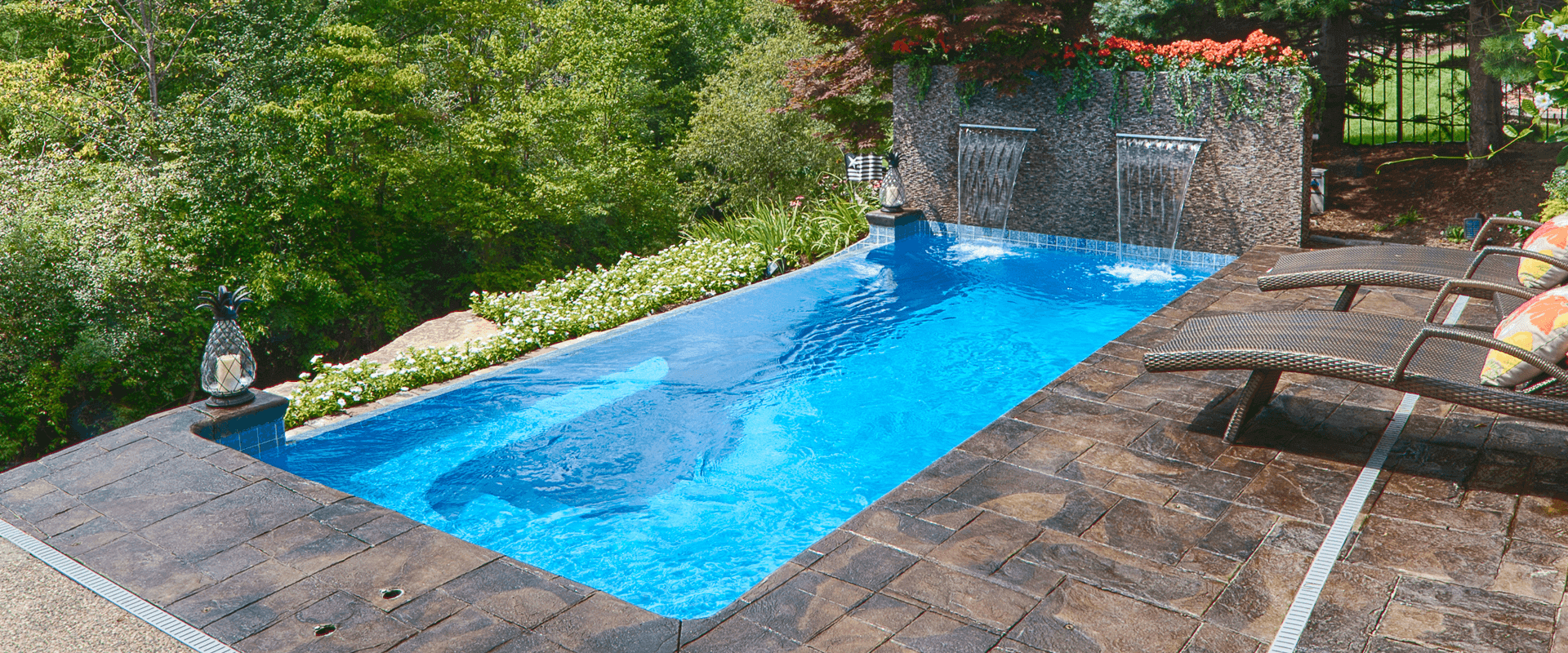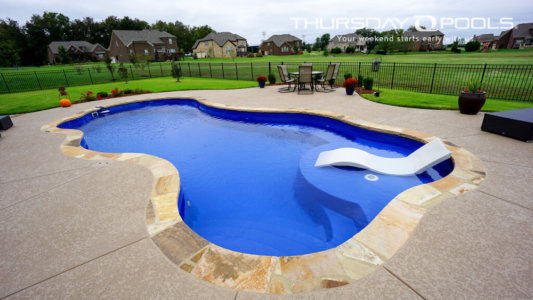877-929-7665
How Much Does a Fiberglass Pool Cost in Kentucky?
If you’re considering installing an in-ground pool in the Bluegrass state, you may be curious about fiberglass pool cost in Kentucky and factors contributing to homeowners’ overall price. The cost of a fiberglass pool can vary widely based on your location, the pool size, and any custom features you might want to add. With warm, humid summers and chilly winters, Kentucky’s distinct climate makes fiberglass pools a wise choice due to their ability to resist cracking or warping during temperature fluctuations.
The geography of Kentucky also plays a role in the cost of installation. In regions with rocky or dense soil, excavation and preparation can be more complicated, potentially raising costs. Urban areas like Lexington or Louisville may have higher labor and material costs compared to more rural parts of the state. When planning your pool, you’ll also want to consider factors like pool accessories, decking options, and local regulations, which can each impact the final price.
What’s the Average Cost of a Fiberglass Pool in Kentucky? Survey Says…
In 2025, Thursday Pools gathered valuable insights through a statewide survey of independent dealers to provide an up-to-date picture of the average cost of fiberglass pool installations in Kentucky. Whether you’re just beginning to explore adding a fiberglass pool to your home or already deep into the planning process, our survey results offer helpful pricing data to help guide your budget and decision-making.
AVERAGE KENTUCKY FIBERGLASS POOL INSTALLATION BY SIZE |
|||
|---|---|---|---|
| Pool Type | Small Fiberglass Pools | Medium Fiberglass Pools | Large Fiberglass Pools |
| Size Range | Up to 26 ft Long or 400 ft² | 26 to 34 ft Long or 400 to 600 ft² | 35 ft and Longer or 600+ ft² |
| Average Cost | $72,000 | $88,000 | $108,000 |
Average Price of Popular Pool Models Installed in Kentucky

SEA TURTLE (9.5’ x 19.5’)
The Sea Turtle stands out in the Thursday Pools lineup, offering a unique blend of style and functionality. With its distinctive design, the Sea Turtle features an open swim area paired with built-in entry steps and comfortable seating, making it perfect for relaxation and active swimming. Some even consider it a plunge pool, thanks to its compact size and refreshing depth. The Sea Turtle is ideal for homeowners with smaller backyards or those looking for a more intimate swimming experience.
Based on our survey of independent Thursday Pools dealers in Kentucky, the average installation cost for a Sea Turtle or similar design under 26 feet long and 400 square feet is $72,000.

ASPEN (14’ x 30’)
The Aspen design combines sleek lines and graceful curves, making it an excellent choice for transforming your backyard and post-work routine. With wide entry steps after a built-in tanning ledge at one end, and deep-end swim-out spots at the other, the Aspen brings people together naturally. Whether you’re looking for a space to relax, swim, or exercise, it offers ample room to enjoy all your activities and poolside moments.
According to our survey of independent Thursday Pools dealers in Kentucky, standard installation costs for an Aspen or similar mid-size designs between 26 and 34 feet long or 400 to 600 square feet average $88,000.
WELLSPRING (16’ x 40’)
The Wellspring is a true showstopper with an impressive design that caters to various needs. Featuring a spacious tanning ledge, entry steps with wraparound benches, and a deep swim lane, the Wellspring is perfect for those who love both relaxation and exercise.
Larger yards, especially in more rural or expansive areas, are ideal for pools like the Wellspring, which stretches over 35 feet long and 600 square feet or more. According to our independent dealers in Kentucky, the average cost for a standard installation of the Wellspring or similar large fiberglass pool models is $108,000.
Understanding Your Kentucky Yard
Kentucky’s diverse landscape presents a variety of soil conditions and terrain types that can influence pool installation. If your property is in an area with rocky or clay-heavy soil, such as the Appalachian foothills or parts of Central Kentucky, excavation may require specialized equipment and additional labor, which can drive up installation costs. Regions with sandy soil, particularly in the western part of the state, may require paying for extra reinforcement to prevent any shifting of the pool over time.
The natural slope of your yard is another important consideration. Homes built on hilly or uneven terrain, common in Kentucky’s more rural and mountainous areas, may require extra grading or retaining walls to ensure a stable and level foundation for the pool and its surrounding decking. Working with a local professional pool installer who understands your area’s unique soil and terrain can help you anticipate and address these challenges.
Tighter spaces may present challenges with large equipment and delivering a one-piece fiberglass pool shell in more urban or suburban parts of Kentucky, such as Louisville or Lexington. Narrow streets or fenced-in properties may necessitate crane rentals or other logistical solutions to ensure a smooth installation.
COMMON ADDITIONAL YARD-RELATED COSTS IN KENTUCKY |
|
| Excavating Sandy Soil | $2,740 |
| Excavating Clay Soil | $2,480 |
| Excavating Rocky Soil | $3,100 |
| Above Average Slope Requiring Extra Grading | $4,080 |
| Average Cost for Limited Access Yards | $3,700 |
Kentucky Swimming Pool Barrier Regulations
When installing a fiberglass pool in Kentucky, it’s crucial to be aware of local safety regulations. While the state has no governing body overseeing pool barriers, homeowners must adhere to Kentucky building codes and local ordinances related to pool enclosures.
Kentucky’s state building code requires that residential pools be enclosed by a barrier at least 48 inches (4 feet) high. Additionally, the bottom of the barrier should be no more than 2 inches above the ground to prevent small children or pets from slipping underneath. A barrier ensures that pools are properly secured and safe for everyone.
In addition to state regulations, many local municipalities enforce their own requirements. For example, Louisville mandates that all private pools, spas, and hot tubs have a fence or barrier at least 4 feet high. Gates and doors must be self-closing and self-latching, with the latch positioned no less than 54 inches off the ground on the pool-facing side of the gate to enhance safety.
As pool barrier regulations can differ by location, it’s crucial to familiarize yourself with the specific rules in your area. Contact local authorities, pool installers, and homeowners associations to gather up-to-date information. Understanding and following these requirements will ensure your pool’s safety and help create a secure environment for your family.
Our independent dealers in Kentucky estimate that homeowners can expect to pay an average of $5,640 for a 300-foot linear fence.
Optional Features and Add-Ons That Influence Fiberglass Pool Cost in Kentucky
Upgrading your fiberglass pool with additional features can elevate your backyard into a personalized retreat. With Kentucky’s seasonal climate, these features offer comfort, aesthetic appeal, and convenience all year round. Based on our 2025 survey of Thursday Pools’ independent dealers, here’s a look at the average prices of popular upgrades Kentucky homeowners love.
Enhancements for Comfort and Ease
Pool Heater Average Cost in Kentucky: $3,900
Enjoy swimming even on chilly evenings in the Bluegrass State. A pool heater extends your swimming season, allowing you to relax in comfortably warm water earlier each spring and through the fall.
UV Filter System Average Cost in Kentucky: $2,400
Clear your pool and reduce chemical use with a UV filtration system. Perfect for the region’s humid summers, you’ll maintain clean and healthy water with minimal maintenance.
Pool Automation and Smart Control System Average Cost in Kentucky: $2,860
Take control of your pool’s temperature, filtration, and lighting from anywhere with a smartphone app. Pool automation makes managing your pool effortless, saving you time and hassle.
Automatic Pool Cover Average Cost in Kentucky: $10,800
An automatic pool cover adds convenience and safety by keeping your pool protected, reducing evaporation, and cutting down on maintenance year-round.
Non-Automatic Safety Pool Cover Average Cost in Kentucky: $3,060
For a more affordable option, a non-automatic cover offers safety and protection, keeping debris out and securing your pool, especially during unpredictable weather.
Automatic Pool Cleaning and Vacuuming System Average Cost in Kentucky: $3,660
Minimize pool maintenance with an automatic cleaning system that keeps your pool sparkling clean and free of debris, giving you more time to enjoy the water.
Pool Decking and Surrounding Features
Poured-concrete patio (Approx. 1,200 sq. ft.) Average Cost in Kentucky: $10,200
Poured concrete offers a durable, cost-effective solution that withstands Kentucky’s changing seasons. It provides a sturdy, expansive surface around your pool, perfect for creating a functional outdoor space.
Paver Patio (Approx. 1,200 sq. ft.) Average Cost in Kentucky: $7,840
Add elegance and practicality with a paver patio. A popular choice for the region, pavers are slip-resistant and adaptable to Kentucky’s fluctuating weather conditions, ensuring lasting beauty and safety around your pool.
Surrounding Landscaping Average Cost in Kentucky: $4,200
Create a more inviting outdoor space with landscaping that complements Kentucky’s natural beauty. Incorporate native plants, flowers, and trees to enhance the pool area and create a harmonious atmosphere in your backyard.
Water Features and Pool Aesthetics for Your Kentucky Backyard
Specialty Waterline Tile Average Cost in Kentucky: $3,140
Add a polished, custom touch with decorative waterline tiles to give your pool a unique look.
LED Pool Lights Average Cost in Kentucky: $2,457.40 per light
LED lights are perfect for Kentucky’s long summer evenings and add style and energy efficiency to your pool area.
Deck Jets Average Cost in Kentucky: $2,060 per jet
Create stunning visual effects with water jets that shoot arcs from the pool deck, perfect for enhancing the pool’s appeal.
Bubblers Average Cost in Kentucky: $2,240 per bubbler
Bubblers create gentle, relaxing water movements in the shallow areas of your pool, adding a playful touch to your Kentucky backyard.
Cascading Waterfalls Average Cost in Kentucky: $3,220
Bring a serene, spa-like atmosphere to your pool area with a cascading waterfall, ideal for relaxing nights.
Relaxation and Entertainment Upgrades
Simple Pool Slide Average Cost in Kentucky: $5,080
Bring classic fun to your pool with a simple slide designed with safety in mind for a family-friendly experience.
Deluxe Pool Slide Average Cost in Kentucky: $7,400
For a more thrilling experience, a deluxe pool slide offers excitement, but be sure to consider safety.
Diving Board (Type 1 Diving Pools Only) Average Cost in Kentucky: $2,380
Only allowed in certified Type 1 diving pools, diving boards offer entertainment but require specific depth and slope for safety.
*Thursday Pools strongly advises against pool slides and diving boards due to safety concerns. The inclusion of a diving board or slide with any fiberglass pool must be carefully reviewed by a licensed professional to ensure compliance with all local building codes, safety regulations, and manufacturer guidelines. Not all fiberglass pool models are suitable for diving or slide use. It is the responsibility of the homeowner and installer to ensure proper installation and usage. Always prioritize safety and consult a qualified expert before adding any diving or sliding feature to your pool.
Add-On Spa Average Cost in Kentucky: $8,180
Pair your pool with an attached spa for a luxurious spillover effect, perfect for Kentucky’s cooler evenings.
Create Your Perfect Kentucky Backyard Retreat with a Fiberglass Pool
A fiberglass pool in Kentucky is more than just a way to stay cool during the summer months—it’s an investment in relaxation, family fun, and the overall value of your home. Whether you’re enjoying the bustling city life of Louisville, the charm of Lexington, or the peaceful expanses of rural Kentucky, choosing the right pool design and features is essential to making the most of your space.
Since no two installations are the same, the best way to get an accurate cost estimate is to consult with a local independent Thursday Pools dealer. These experts will assess your yard’s unique features, guide you through considerations like excavation, accessibility, and fencing, and help you select a pool style and upgrades that fit your vision and budget.
Ready to get started?
Request a Consultation
Thursday Pools® manufactures fiberglass pool shells and does not install pools. Pools are installed by locally owned independent dealers. Consumers should consult a local independent dealer for the most accurate and updated information based on the unique conditions of their region and property.

